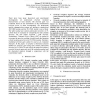Free Online Productivity Tools
i2Speak
i2Symbol
i2OCR
iTex2Img
iWeb2Print
iWeb2Shot
i2Type
iPdf2Split
iPdf2Merge
i2Bopomofo
i2Arabic
i2Style
i2Image
i2PDF
iLatex2Rtf
Sci2ools
107
click to vote
IEICET
2007
2007
Analysis of Polarization Diversity Gain at Base Station in W-CDMA System
There have been many theoretical and experimental investigations on polarization diversity reception characteristics at base stations. The diversity gain was evaluated based on the distribution of the instantaneous received power in these investigations. The mainstream mobile communication systems are shifting to standardized IMT-2000 systems and the W-CDMA system is one of them. The effect using base station polarization diversity in WCDMA must be evaluated by considering not only antenna diversity, but also RAKE reception / path diversity. Furthermore, Transmit Power Control (TPC) is applied to overcome the near-far problem of mobile units that maintain a fixed reception power level in W-CDMA systems. Therefore, traditional diversity gain cannot be used as an evaluation indicator. In this paper, we propose a theoretical analysis method for diversity gain using base station polarization diversity in W-CDMA. We also clarify the analytical results of practical diversity gain and verify...
| Added | 14 Dec 2010 |
| Updated | 14 Dec 2010 |
| Type | Journal |
| Year | 2007 |
| Where | IEICET |
| Authors | Masaru Fukushige, Tetsurou Imai |
Comments (0)

